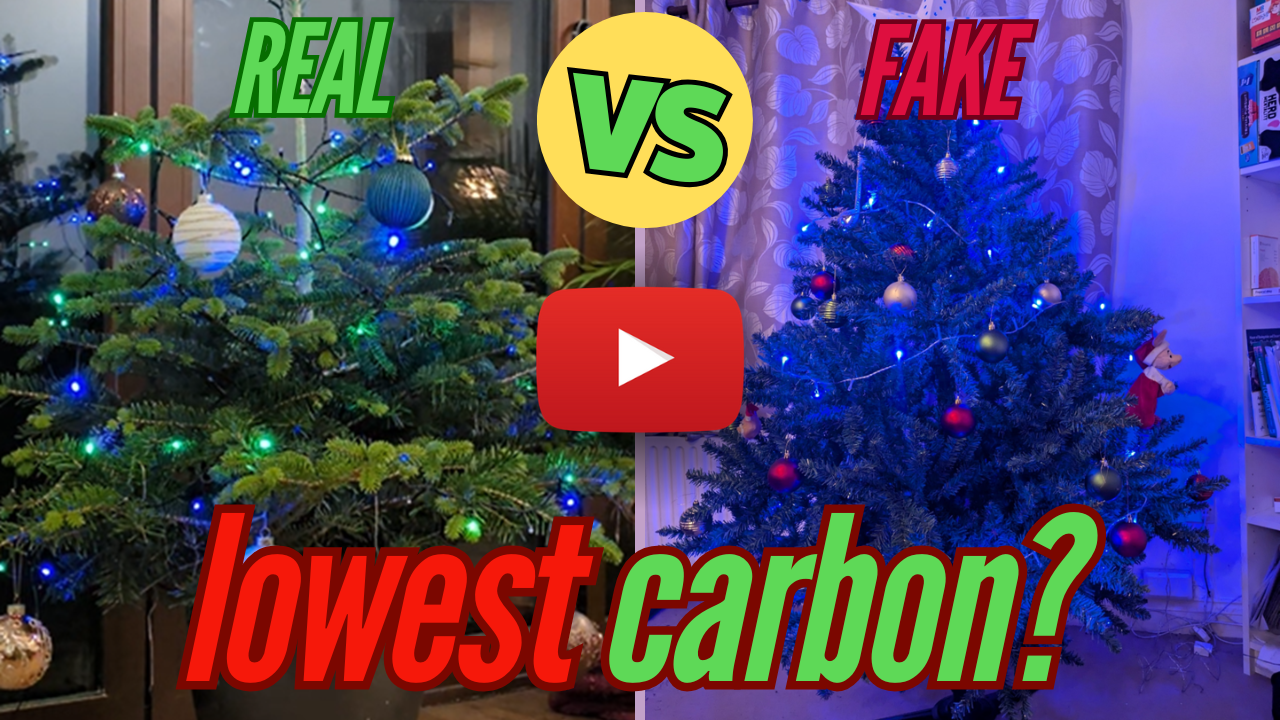We are often asked what you can do to be more sustainable during the Holiday Season - particularly so as we look forward to Christmas 2025, so here are our top tips on how to reduce carbon, cut costs, and decrease waste whilst also supporting your favourite environmental and humanitarian causes this Christmas.
Now - our growing team remains quite a musical bunch here at Carbon Footprint (our hidden talents of piano, violin, cello, clarinet, guitar, ukulele, recorder and a healthy dollop of musical theatre) - so, this year, we give you our tips to the theme of the 12 days of Christmas!
A Partridge in a Pear Tree
When it comes to Christmas trees, which is better; real or artificial?
Obviously, a live tree that is kept and allowed to grow from year to year is best – but we realise that most live trees are cut.
Life cycle Analysis (LCA) of the American Christmas Tree Association 2018 showed that on a carbon basis, artificial trees are only lower in carbon than real cut trees after at least 5 years of use. And that doesn't even consider the plastic footprint.
If you go for a cut tree, ensure to choose from a local sustainable source to limit your footprint. Trees in the UK are typically composted by local authorities to make soil improvers, but this process still releases about 50% of the CO2 sequestered (search 'Christmas recycling' which should pull up details of collections & collection points within your region). Also be aware that intensively farmed Christmas trees are often sprayed with chemicals, that are hardly supportive of biodiversity. Choose Forest Stewardship Council approved trees to improve your environmental impact.
So if you can't grow and keep your own tree, the best option is likely a locally sourced, Forest Stewardship Council approved tree that you make sure is recycled at the end of its life. If you go plastic, or already have one, make it last as long as possible. It is unlikely it is recyclable, but if it is in good condition when you want to move on, why not donate it rather than sending it to landfill.
To compensate for the environmental impact of your Christmas Tree, you can also fund the planting of trees through our UK Tree Planting Project, and our Kenya Tree Planting Project. You can also have a look at our Tree Planting Map which showcases where we have planted all trees since 2017!

Two Turtle Doves
Travelling far this Christmas? Be sure to travel safe & carbon conscious
Making sure your car is winter weather ready is not only a great thing for safety, it is also an easy way to lower your carbon. Simple things can all make a difference, such as; checking your tyre tread & inflation pressure, using high gears safely, not leaving the car idling in long queues and utilising the start/stop facility if you have one.
Think about travelling during quieter hours and cruising along in top gear to save fuel and carbon! Or if you are travelling home from Uni or College; go by train or lift share - a cross country drive will seem much shorter with a buddy on board. A car journey from London to Liverpool (in an average petrol car) produces 56kg of CO2e – whilst the train for the same journey is just 10kg per person.
Whether it’s to visit friends/family or to absorb the Christmassy atmosphere abroad, any flights will increase your carbon footprint big time! A return trip London to New York is 1.64 tonnes of CO2e per person. For the average person in the UK, that is equivalent to around 1/5 of your yearly emissions.
Work out your Travel Carbon Footprint using our free carbon calculator
About Carbon Offsetting & funding the solutions to climate change - video

Three French Hens
Nestling down this evening? Keep cosy whilst reducing your impact.
Crack out your favourite Christmas jumper and turn down the heating by 1 degree to save £69 each year for an average household gas bill of 12,500kWh.
The heat from the turkey roasting in the oven on Christmas day will also provide extra heating to the house! Also, when you do have the heating on, ensure you only heat the rooms you need to prevent wasting energy heating rooms that don't need it.
Turning heating down 1°C saves £69 each year - that's 180kg CO2

Four Calling Birds
Calling you to consider environmentally friendly wrapping paper.
When wrapping those Christmas presents, consider reusing wrapping paper, making your own from magazines/newspapers around the house or using reusable wrapping fabric - perfect for use in stockings. You can get creative with whatever style suits you, using bags, boxes, old fabric or even not wrapping the present in stockings at all. Using string instead of tape will also help to preserve the wrapping paper.
Make sure to recycle wrapping paper and Christmas cards/envelopes after Christmas and avoid buying glossy or glittery wrapping paper that is unrecyclable. You could even keep some of the cards to turn into gift tags next year.
Each year around 5 extra sacksful of waste are produced per household over the Holiday Season which is equivalent to an extra 1.4 tonnes CO2e! more info

Five Gold Rings
Your rings of bright lights can provide easy carbon savings
Put your indoor and outside Christmas lights on a timer so that they aren’t wasting electricity when you forget to turn them off after a couple of sherries.
Choose LED lighting in your house normally and for Christmas decorations to save money on your energy bill. LEDs can save up to 80% of lighting energy costs: using a standard 100W light bulb for 4 hours a day costs you £39.93/year but a low energy light bulb costs only £7.99/year and saves 30kg CO2 per bulb.
You could also consider solar powered smaller lights to go in your garden instead of full battery or mains powered.

Six Geese a-Laying
Whether it's goose, turkey or nut roast, food is an essential part of Christmas.
Prepare and plan for the right amount of food to minimise waste! Though we don’t encourage 'BOGOFs, if you do get one (two!) donate to a food bank. Simple and small things like letting people serve themselves so they only take what they want rather than giving everyone the festive supersize will help prevent binning food. If any food does become waste, ensure to use the food waste bin. Try to buy local and in season to reduce the carbon footprint of your food.
Anything else cooking? Prepare and cook food in decent sized batches to make the most of a hot oven. Don't leave the oven on when you don't need it - you will be just wasting energy. Make sure you choose the right cookware for the job (glass and ceramics are best for the oven, copper-based pans for the hob). Also consider steam cooking those controversial sprouts and other vegetables as you can cook them all at the same time, it’s healthier and requires less energy to cook all at once.
Well over 4 million Christmas dinners are thrown away every year in the UK according to The Independent. This is equivalent to 263,000 turkeys; 7.5 million mince pies; 740,000 slices of Christmas pudding; 17.2 million Brussels sprouts; 11.9 million carrots and 11.3 million roast potatoes.

Seven Swans a-Swimming
Diving for the best cracker prices each year only to chuck them out the next day?
The vast majority of us don’t keep our prizes from Christmas crackers much beyond the end of the meal; so why not consider getting crackers with just the cheesy jokes and hats, making sure to recycle the paper and cardboard afterwards?
Alternatively, fill or make your own cracker to add fun and a more personalised touch to your crackers.
Considering simple steps like this to cut out unnecessary waste can reduce your carbon impact and encourage a more sustainable lifestyle.

Eight Maids a-Milking
Do you usually milk Christmas for all its worth and end up with presents you don't want/need?
If you get something you wouldn't have chosen as your first choice (or it's something you have already) - you can re-gift items to your local charity for those more in need to enjoy.
Got a friend or family member who loves to do their bit for the planet? Give the gift of carbon offsetting by supporting one of our projects, which also bring environmental, economic and social benefits to the local communities, for which you can download a gift certificate. You can now also gift a ‘monthly subscription’ to support the fantastic projects throughout the year.
To avoid those unwanted gifts and to improve your sustainability even further, you could simply reduce the number of presents exchanged, this way you can spend more money per gift to ensure it is durable and eco-friendly. Giving experiences rather than a physical gift is another great way to reduce potential waste whilst also providing exciting and thoughtful gifts that are a bit different. The UK uses 227,000 miles of wrapping paper each year.

Nine Ladies Dancing
Crack out your dance moves to reduce your footprint!
Try and reduce TV time at Christmas by getting the whole family involved in interactive games, dancing or even going for a walk!
Planning fun outings or games evenings can bring added fun and memory making to the festive period.
From lovely nature walks, Christmas markets and pantos there are plenty of ways you can make the most of the holiday without screens. For those with kids, whilst on your walk, you can even collect twigs, berry and leaves to make your own Christmas decorations.

Ten Lords a-Leaping
Leap into action this Christmas to help those less fortunate.
For the homeless and the elderly, Christmas can be a difficult time. We mustn't forget that Christmas is a time for giving, be it monetary donations or donations of toys, clothes or food, there are many charities where these gifts can make a positive impact to the less fortunate.
Your donations and also your time volunteering are valuable to organisations such as Crisis and AgeUK to name but two.
You could consider making a reverse advent calendar, adding an item of food or clothing in each day to be given to food banks or charities. This is great to help out those less fortunate whilst getting into the Christmas giving spirit and encouraging a less wasteful lifestyle.

Eleven Drummers Drumming
March into the new year with a pledge to reduce your footprint.
Make a Low Carbon resolution and stick to it – start by measuring your Carbon Footprint and make a pledge of how much you will save in 2026.
Setting a target, with small steps and goals to help you get there can help to keep you motivated whilst tracking your success - e.g. try to reduce your transport emissions by giving up the car one day a week or trying to reduce your meat and dairy intake.

Twelve Pipers Piping
Piping to the sweet tune of carbon neutrality.
You should strive to reduce your emissions as much as reasonably possible but you will not be able to completely remove your carbon footprint. To compensate for these emissions, you can offset by funding an equivalent carbon dioxide saving elsewhere. To find out more about carbon offsetting, check out our new Carbon Offsetting FAQs.
Offsetting through our environmental projects not only reduces your impact and helps to combat climate change, it also supports the local communities by providing social and environmental benefits, such as improvements in employment, health and biodiversity. Our video explains how to choose a good carbon offset project to make a positive contribution to the environment.
Support Carbon Removal, Reduction & Tree Planting Projects across the GlobeKenya Tree PlantingUK Schools Tree PlantingOur International Carbon Offset ProjectsGift Certificates available on-line |



